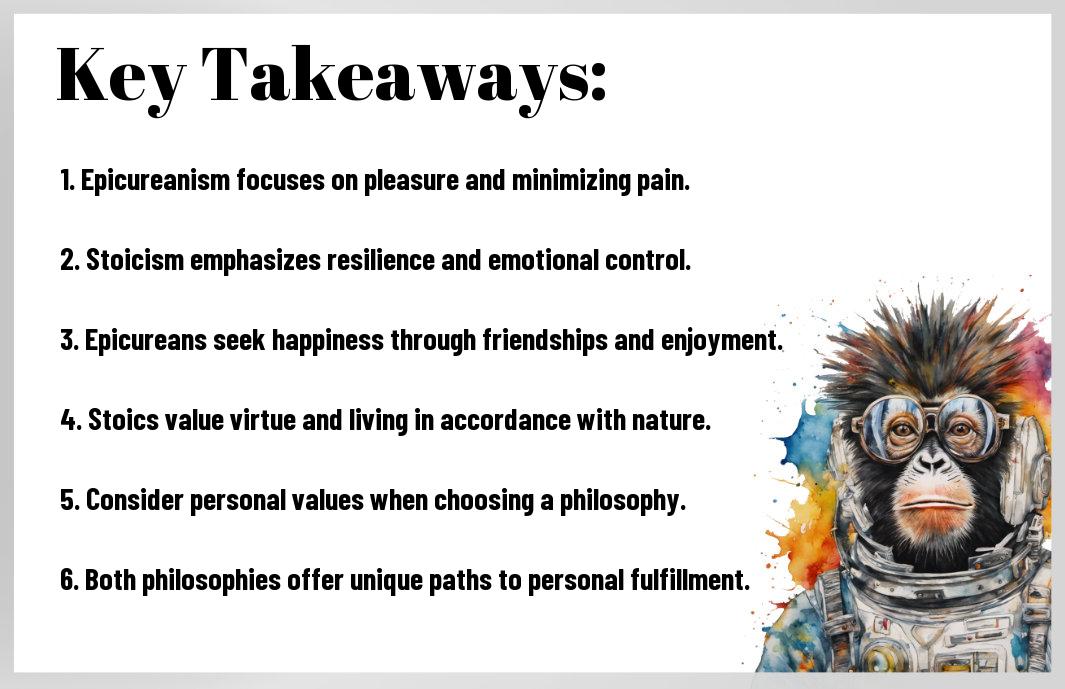
Newsletter Subscribe
Enter your email address below and subscribe to our newsletter

Enter your email address below and subscribe to our newsletter

Epicureanism offers a unique perspective on happiness, emphasizing pleasure and the pursuit of simple joys in life. Meanwhile, Stoicism teaches resilience and finding peace through acceptance and rationality. In this blog post, I’ll explore the key principles of both philosophies, helping you determine which aligns best with your values and lifestyle. Whether you’re seeking to savor everyday experiences or cultivate inner strength, understanding these two schools of thought can guide you in making meaningful choices for your well-being.


For those unfamiliar with the term, Epicureanism is a philosophical system founded by the ancient Greek philosopher Epicurus. It emphasizes the pursuit of happiness and makes a strong case for seeking pleasure while avoiding pain. Epicureanism encourages individuals to find joy in simple pleasures, cultivate inner contentment, and live a life rich in meaningful experiences. I find it fascinating how this philosophy invites us to explore what genuinely makes us happy and to appreciate the beauty of life’s fleeting moments.
Pleasure, within the context of Epicureanism, is often misunderstood. It’s not just about indulgence in sensual delights or hedonistic excess; rather, it focuses on intellectual and emotional pleasures. I’ve come to appreciate that Epicurus advocated for a balanced approach, where we seek long-term satisfaction that brings us peace and joy. This includes savoring good food, enjoying nature, and immersing ourselves in art, activities that nourish the soul and create lasting happiness.
Below the surface of personal pleasure lies the profound significance of friendship in Epicureanism. I believe that meaningful connections with others can amplify our experiences of joy and comfort. Epicurus stated that friendships are among the greatest sources of happiness, as they provide support, companionship, and opportunities for shared enjoyment. When I reflect on my life, I can see how those quality connections with friends have enriched my journey, making even ordinary moments feel extraordinary and pleasurable.
At its core, Epicureanism teaches that the bonds we forge with others are not only vital for our happiness but also for our emotional well-being. Cultivating deep, genuine friendships can offer us a sense of belonging and understanding that transcends individual pleasure. So, as you explore this philosophy, think about the role your relationships play in your pursuit of happiness and how they can enhance the simplicity and joy of everyday life.
Any discussion on Stoicism begins with understanding its core philosophy. At its essence, Stoicism is an ancient Greek school of thought that teaches resilience in the face of life’s challenges. Founded by Zeno of Citium in the early 3rd century BCE, Stoicism emphasizes rationality, virtue, and the importance of accepting things we cannot change. As I dive deeper into Stoicism, I realize it’s not just about enduring pain, but about thriving in adversity by cultivating an inner strength that helps me navigate life’s unpredictable nature.
For me, embracing virtue is one of the foundations of Stoicism. Virtue, in Stoic terms, is about living in accordance with reason and aligning your actions with moral integrity. This journey towards virtue requires consistent self-reflection and a commitment to improving oneself without becoming overly attached to external outcomes. I have found that focusing on what I can control, such as my thoughts and reactions, allows me to steer my life toward a more virtuous path.
An interesting aspect of Stoicism is its emphasis on finding peace amidst chaos. Life can often feel overwhelming with its numerous uncertainties and challenges, which is why Stoics advocate cultivating a calm center within ourselves. I’ve discovered that Stoicism encourages me to focus on the present and to accept the chaos around me without letting it disrupt my internal peace. The practice of mindfulness and reflection, as taught by Stoic philosophers, helps me to maintain my tranquility even when external circumstances are tumultuous.
Virtue and the peace that comes from it do not imply that one should suppress emotions or avoid challenges; rather, they suggest a balanced approach to handling life’s trials. Engaging in daily practices such as meditation, journaling, or simply pausing to reflect on my reactions to situations can help anchor my mind. Each time I employ these techniques, I find that I am better equipped to embrace life’s unpredictability without being overwhelmed by it.

After plunging into the philosophies of Epicureanism and Stoicism, I realized that while both offer paths towards a fulfilling life, they approach happiness and life’s challenges in distinctly different ways. The beauty of these philosophies lies in their unique perspectives that can help you navigate your own life choices. Understanding the contrasts can empower you to choose the one that resonates more with your personal values and aspirations.
Views on happiness serve as a cornerstone for both Epicureanism and Stoicism. As an Epicurean, your pursuit of happiness often revolves around pleasure; however, it’s important to note that Epicureans emphasize simple pleasures and the absence of pain over indulgence in excess. This focus allows for a deeper appreciation of life’s small joys while recognizing that true happiness comes from a well-balanced life rather than fleeting, extravagant experiences. On the other hand, Stoics adopt a more restrained viewpoint. They believe that happiness comes from aligning oneself with nature and virtue, rather than external pleasures. For you, this could mean finding contentment within yourself and your choices, instead of relying heavily on external circumstances or material possessions.
Among the many differences I found between these philosophies, the approach to life’s challenges stands out prominently. Epicureans tend to navigate difficulties by focusing on minimizing pain and maximizing pleasure, often choosing to avoid situations that might lead to discomfort. This can be quite liberating, as it encourages you to eliminate unnecessary stress and embrace what brings you joy. Stoicism, however, takes an entirely different route. Stoics view challenges as opportunities for growth, emphasizing the importance of resilience and self-control. They encourage you to accept what you cannot change and find strength in adversity, which can foster a sense of inner peace and fulfillment, regardless of your external circumstances.
Between these two philosophies, you may feel drawn to different elements of each when it comes to facing life’s challenges. If you prefer a more tranquil route, perhaps the Epicurean way offers a comforting blanket with its focus on pleasure and avoidance of pain. Yet, if you find empowerment in adversity and resilience appeals to you, the Stoic approach might resonate more deeply. Ultimately, it’s about discovering the balance that allows you to embrace challenges while still enjoying the simpler pleasures life has to offer.
Once again, as I investigate deeper into Epicureanism and Stoicism, I’m struck by how each philosophy can uniquely resonate with different lifestyles. Consider how you approach happiness and fulfillment—are you more inclined to savor life’s pleasures as an Epicurean, or do you find solace in the emotional resilience that Stoicism offers? The choice ultimately boils down to how you envision your daily life and what values you hold dear. If finding joy in simple pleasures and building meaningful relationships is at the core of what you cherish, perhaps Epicureanism might align better with your pursuits. On the other hand, if you see the merit in maintaining composure amidst life’s challenges, Stoicism could be a more fitting companion in your journey.
In this personal exploration, it’s vital to assess how each philosophy could weave into your daily experiences. Do you find strength in routines that allow you to engage deeply with both your emotions and the world around you? Or do you prefer a methodical approach that teaches you to embrace adversity and cultivate inner peace? I believe that evaluating these aspects will guide you in determining which philosophy complements your lifestyle and personal growth.
About my journey in reflecting on my values, I’ve come to recognize that what matters most to me is indeed intertwined with these philosophical frameworks. Do I place a high value on comfort and enjoyment, or is my focus on resilience and overcoming obstacles? This reflection has led me to embrace the essence of each philosophy, allowing me to appreciate the pleasures of life while also developing the strength to confront difficulties. Knowing what I value helps me align my actions with my beliefs, ultimately guiding me in choosing a philosophy that suits my life’s path.
As you take time to contemplate your own values, think about how they shape your decisions, relationships, and overall outlook. I encourage you to journal or meditate on what truly resonates with you—whether it’s creating moments of joy or seeking serenity amidst uncertainty. This proactive reflection can illuminate which philosophical approach could best enrich your life.
On the topic of integrating these philosophies into daily routines, I find that both Epicureanism and Stoicism offer practical advice that I can easily apply. For instance, as an Epicurean, I can intentionally create moments of joy, such as sharing a meal with loved ones or taking time to enjoy nature. The pursuit of happiness becomes an active endeavor, inviting me to explore life’s delights. Conversely, the Stoic practice of reflecting on what is within my control empowers me to navigate challenges with grace, reducing anxiety through acceptance and understanding. Both philosophies promote a balanced approach to living, allowing me to handle life’s ups and downs with a sense of purpose.
Your interest in how these philosophies can be applied in a tangible way may propel you toward practical experiments. Perhaps you could start by setting aside time each week to engage in an activity that embodies an Epicurean mindset, such as enjoying a hobby or creating a pleasurable ambiance at home. Alternatively, you might try journaling daily thoughts to embrace a Stoic mindset, helping you process emotions and fostering resilience. By mixing and matching elements from both philosophies, your daily life can become a rich tapestry of experiences that fulfill your emotional and practical needs.
Now, when I think about influential Epicureans, a few names stand out that really show how Epicureanism can manifest in various aspects of life. Examples include the philosopher Epicurus himself, who founded this school of thought in ancient Greece, promoting pleasure as the ultimate goal of life, but with a very refined and thoughtful approach. He believed in the pursuit of simple pleasures, friendship, and knowledge while avoiding pain and fear. Another influential figure is the Roman poet Lucretius, whose work “On the Nature of Things” beautifully articulates Epicurean principles and emphasizes the importance of understanding nature to secure true happiness. Both of these thinkers provide valuable insights into living a fulfilling life through moderation and wisdom.
The prominent Stoics like Seneca and Marcus Aurelius have left a remarkable legacy that illustrates the practical application of Stoic philosophy. Seneca, a Roman statesman and philosopher, emphasized the importance of self-control, virtue, and the acceptance of fate in his letters and essays. His lifework encourages us to focus on what we can control while remaining indifferent to what we cannot. Marcus Aurelius, as a Roman Emperor, practiced Stoicism daily, and his “Meditations” serve as a personal diary reflecting his thoughts on duty, resilience, and self-improvement. Each of these thinkers has valuable lessons that can guide us through life’s challenges by promoting inner strength and serenity.
Epicurean philosophy offers an enticing perspective on pleasure and happiness, while Stoicism inspires us to rise above external circumstances, both philosophies holding significance for you in today’s world. By examining the lives and teachings of these notable Stoics, you can find inspiration in their ability to cultivate tranquility and purpose amidst adversity. I see these approaches as complementary rather than oppositional, meaning that you can incorporate elements of both philosophies to create a balanced and fulfilling life tailored to your values and circumstances.
Considering all points, I believe that both Epicureanism and Stoicism offer valuable insights into how we can live our lives more fully. Each philosophy emphasizes different aspects of well-being; while Epicureanism invites us to savor pleasure and foster connections, Stoicism encourages resilience and maintaining a balanced perspective amidst life’s challenges. As you reflect on your own values and what resonates with you, it’s important to recognize that a combination of both philosophies might be the ideal approach for your unique path. Perhaps you’ll find that focusing on simple pleasures creates a joyful day-to-day experience, while Stoic practices help you navigate life’s inevitable hardships with grace and ease.
Ultimately, it comes down to what feels right for you. I encourage you to explore more about both philosophies, and if you’re curious about the differences between them, check out this insightful piece on Stoicism vs. Epicureanism: what are the differences? As you engage with these ideas, I hope you’ll find a philosophy that aligns with your perspectives and enhances your journey toward fulfillment and inner peace.
A: Epicureanism emphasizes the pursuit of pleasure and the avoidance of pain as central to a good life. It advocates for simple pleasures, friendships, and personal reflection, while promoting the importance of knowledge and moderation. Epicureans believe that understanding the world around us can help minimize fears, particularly the fear of death, leading to a serene life.
A: Stoicism is grounded in the idea that virtue, self-control, and rationality are the keys to a fulfilling life. Stoics stress the importance of recognizing what is within our control and what is not, encouraging individuals to focus on their responses to external events. They teach that emotional resilience and acceptance of fate can lead to tranquility regardless of circumstances.
A: Epicureanism views pleasure as the highest good and the ultimate goal of life. However, it distinguishes between physical pleasures and mental pleasures, advocating for the latter as more sustainable. In contrast, Stoicism refrains from prioritizing pleasure, suggesting that true happiness comes from virtue and internal satisfaction rather than indulgence in sensory pleasures.
A: Epicureanism is more directly focused on individual happiness, framing it as the pursuit of pleasure and an absence of pain. Stoicism, while it acknowledges the importance of personal well-being, centers more on living in accordance with virtue and reason, suggesting that happiness results from personal character and understanding rather than direct pursuit of pleasure.
A: Yes, many individuals find value in combining elements from both philosophies. One might adopt the Epicurean focus on moderation and meaningful relationships, alongside Stoic resilience and acceptance of external challenges. This blended approach can provide a fuller perspective on navigating life’s complexities while balancing pleasure and duty.
A: Stoicism encourages embracing adversity as an opportunity for growth, emphasizing that our responses define our experiences. It teaches acceptance of fate and the importance of maintaining virtue in challenging situations. Epicureanism, while not focused on adversity in the same direct way, encourages the minimization of pain and the pursuit of mental tranquility to counteract difficult times.
A: The choice largely depends on individual preferences and needs. Stoicism may appeal to someone who seeks strategies for resilience and coping with external pressures through rational thought and virtue. On the other hand, Epicureanism could resonate more with someone looking for immediate relief from stress through enjoyment of simple pleasures and meaningful relationships. Ultimately, personal reflection is key to determining which philosophy aligns best with one’s life circumstances.